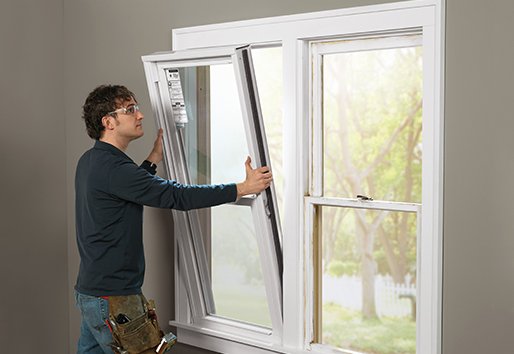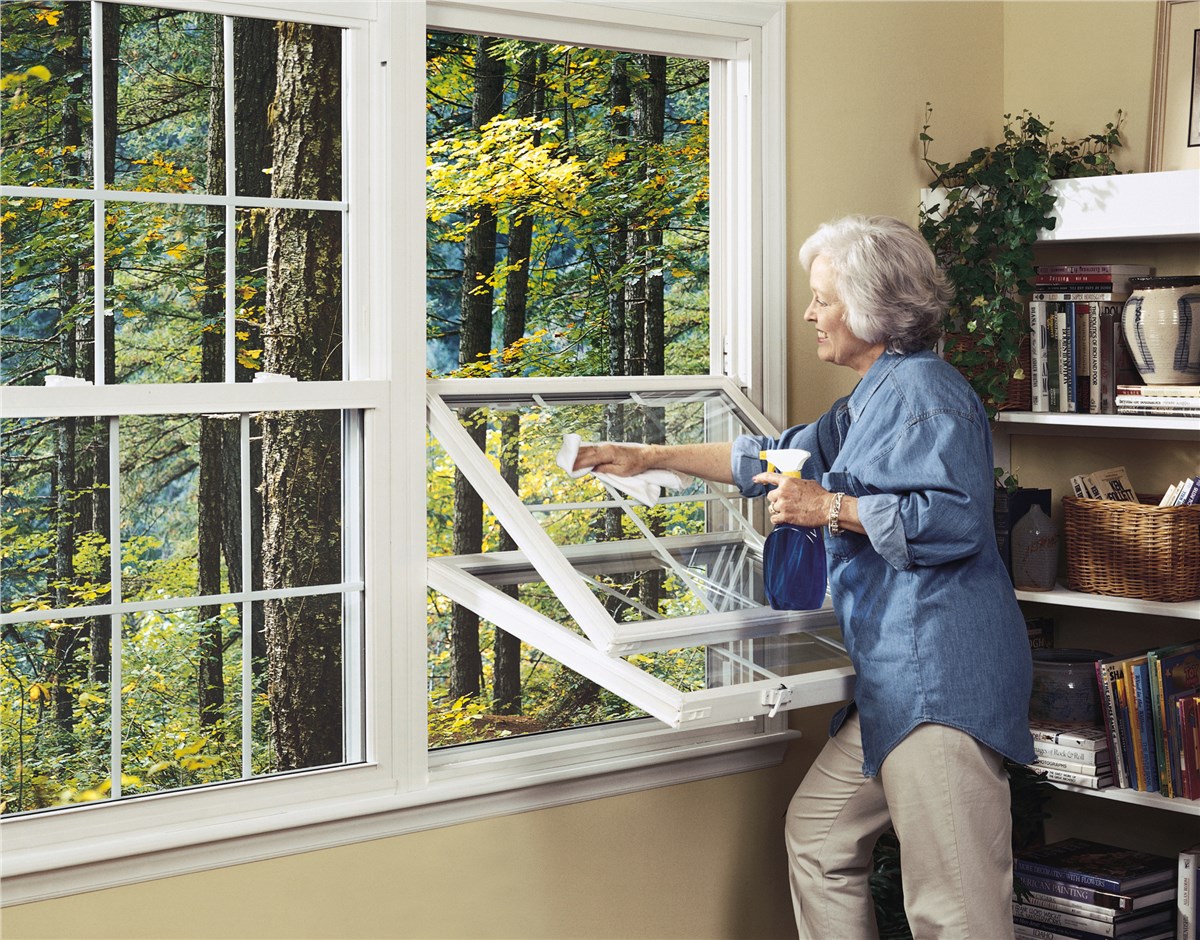There is a broad range in how much it cost to window replacement because of variables including window style, window size, window material, and even geographic location.
The average cost to replace a single window with vinyl is $350 to $700, while the same window made of wood or composite can cost $500 to $1,000. Having a professional install them can cost an extra $100 – $300 each window.
It’s smart to solicit bids from several service providers so you can compare costs and choose on a reasonable one.
What factors affect the cost of window replacement?
There are several variables that can affect how much it will cost to replace the windows in your home. The size and shape of the home’s windows, the building materials, and the neighbourhood all play important roles.
For a deeper understanding of what goes into determining the final price of a window replacement, we’ll be delving into these aspects in further depth below.

Type and Size of Windows
The replacement cost of windows is greatly influenced by their size and style. The size of the window will effect both the cost of the window itself and the cost of installation. A larger window, for instance, will cost more to install due to the increased need for materials and labour.
The cost to replace a window might vary widely depending on its type. A few of the most typical varieties of window are:
- Vinyl windows: Vinyl windows may be purchased for $300 to $700 apiece, making them one of the more cost-effective choices.
- Wood or composite windows: Wooden or composite windows can cost anywhere from $500 to $1,000 per, which is quite a bit more than vinyl windows.
- Aluminum windows: Aluminum windows, while less popular, can still be purchased for between $300 and $600 apiece.
Materials Used
The materials chosen can have an impact on the final cost of a window replacement project. The entire budget may be affected by the choice of materials used to construct the windows. For instance, vinyl windows are more cost-effective than their wood or composite counterparts.
Location
The price of new windows may also be affected by your neighbourhood. It may cost more to have your windows replaced if you live in a more rural region or one with a higher cost of living than it would in a more urban setting.
The cost of labour might vary widely depending on location, thus that factor also needs to be considered.
Professional Installation
Last but not least, the price of expert installation can add significantly to the total cost of window replacement.
If you want your windows installed correctly, it’s best to engage a professional contractor who has the necessary experience and equipment. Installing windows professionally can cost an extra $100 – $300 each window.
In conclusion, the expense of window replacement is highly variable due to factors such as the specific kind and size of windows being installed, the quality of the materials, the cost of labour in the homeowner’s geographic region, and so on.
Getting numerous quotes from different contractors will give you the most accurate idea of how much it will cost to replace the windows in your home.
DIY vs. Pro: Deciding Between Window Replacement Options
It’s up to the homeowner to decide whether they want to replace the windows themselves or hire an expert. There are benefits and drawbacks to both approaches, and the final decision should be based on the homeowner’s level of DIY experience and comfort, as well as the nature and complexity of the window replacement work to be done.

Replace Your Own Windows Like a Pro
DIY window replacement can save you a lot of money, which is one of its key benefits. You can save money on labour and possibly even on materials if you perform the work yourself. Not only that, but you may customise your home however you like by picking the windows and building supplies.
While it may save money in the long run, there are some negatives to replacing windows on your own. One major drawback is the time and effort it may take to complete.
As a corollary, getting hurt is possible if you aren’t experienced with the procedure. Incorrect installation can also cause draughts, leaks, and other issues that lower your home’s energy efficiency and comfort level.
Gaining the Services of a Qualified Expert
However, there are several benefits to working with a professional window installer. First and foremost, experts have the knowledge and training to complete the task in a safe and effective manner.
They are also well-equipped to complete the task at hand. Homeowners may rest easy knowing that the windows and the work done to replace them are covered by warranties offered by expert window replacement firms.
The expense of employing a specialist is, however, a major drawback. Having your windows replaced by a professional can cost more than doing it yourself because of the cost of labour and, in certain cases, more expensive materials.
In conclusion, whether a homeowner should repair their own windows or hire a professional relies on the homeowner’s level of experience and comfort with DIY projects, as well as the type and complexity of the window replacement project.
If you’re handy with tools and don’t mind putting in the effort, replacing your own windows can save you money.
However, hiring a professional may be the preferable option if you lack the necessary experience or equipment, or if you simply prefer the piece of mind that comes with a job well done.
What are the different types of windows available for replacement?

There are various varieties of replacement windows to choose from, each with their own set of advantages and disadvantages. A few of the most typical varieties of window are:
- Double-Hung Windows: The most common form of window, casement windows have two movable sashes that can be opened and closed in a horizontal motion. For smaller homes, double-hung windows are an excellent option because of their compact design.
- Casement Windows: Single-hung windows have one sash that is hinged to the frame. Casement windows may be opened easily and allow for plenty of fresh air to enter the room.
- Awning Windows: This style of window resembles casement windows but opens outward from a top hinge. Due to their ability to be opened while yet providing protection from the weather, awning windows are an excellent option for homes in rainy or humid climates.
- Sliding Windows: One or more movable panes, called sashes, glide horizontally on a track to open and close the window. Sliding windows are convenient for smaller homes since they require less floor space.
- Bay Windows: These are a set of three windows that extend outward from the wall of a room, with one large window in the middle and two smaller windows on either side. These windows can give your home a unique look and feel while also letting in natural light and expanding the interior square footage.
- Picture Windows: The primary reasons for installing such large, non-operable windows are to let in natural light and provide a view.
- Hopper Windows: These basement or crawlspace windows open inward on a hinge at the bottom.
- Tilt-Turn Windows: These windows may be opened like a door or tipped inward for ventilation, making them simple to clean from the inside.
Your demands, your home’s design, and your budget all play a role in determining which windows are best for you. Before deciding on a certain type of window for your home, it’s a good idea to conduct some research and comparison shopping.
Is it worth it to replace windows?
Although replacing your home’s windows may be a big financial commitment, the many advantages you may enjoy may make the expense worthwhile. Common factors that lead homeowners to decide on a window replacement project are:
- Energy Efficiency: You can increase your home’s energy efficiency by installing new windows, which can have a positive impact on your monthly utility expenses and the quality of life inside.
- Improved Comfort: Drafts from ancient windows can make a home uncomfortably cold in the winter and hot in the summer. Changing out your old windows for new ones is a great way to seal out the cold and make your home more comfortable.
- Increased Home Value: Improving your home’s windows can raise its resale value and make it more appealing to purchasers.
- Enhanced Curb Appeal: Putting up new windows is a great way to modernise your home and increase its value.
- Easy Maintenance: It is possible to spend less time washing and maintaining your windows if you choose a current model.
- Noise Reduction: When you replace your windows, you may lessen the amount of outside noise that enters your home, making it a more pleasant place to rest.
Window replacement can be beneficial, but the extent to which it does so depends on the state of your current windows, the windows you choose, and the expertise of the professional who instals them.
A skilled window contractor can inspect your current windows, evaluate your needs, and give you an idea of the financial and practical implications of window replacement.
Are there any tax credits or incentives available for window replacement?
Depending on your area and the specifics of your project, you may be eligible for tax credits or incentives for replacing your windows.
There used to be federal tax credits in the United States for making energy-efficient improvements like replacing windows, but there aren’t any of those left at the moment. Some states and municipalities may, however, provide financial incentives for window replacement.

Whether you want to replace your windows but don’t want to pay full price, you should investigate if you qualify for any tax credits or other incentives from your state or local government.
To further encourage energy efficiency and decrease electrical consumption, some utility companies may provide incentives for window replacement.
Additionally, the energy savings from new windows can make them a cost-effective investment even if there are no special tax credits or incentives available for window replacement.
Talking to a tax expert or financial planner is a must if you want to know the ins and outs of window replacement from a financial and tax perspective, and if you want to know if any tax credits or other advantages apply to you.
Frequently Ask Questions
How much does it cost for window replacement?
When estimating the price to replace your windows, it’s important to consider the following factors: the type of window, the size and number of windows, and the location of your home. The typical cost to replace a window in a home is between $300 and $1,500.
What are the different types of windows available for replacement?
Double-hung windows, casement windows, sliding windows, bay windows, and picture windows are some of the most popular options for window replacement.
What factors affect the cost of window replacement?
When calculating the total price to replace windows, it’s important to consider variables including the type of window, the size of the window, the number of windows being replaced, the home’s location, and the cost of labour.
Is it worth it to replace windows?
Replacing draughty, outdated windows with modern, energy-efficient models can reduce monthly energy costs for most homeowners. The aesthetic quality and market value of a home can both benefit from new windows.
Are there any tax credits or incentives available for window replacement?
If you decide to replace your windows with energy-efficient ones, you might be eligible for tax credits or refunds from the federal government and your state. If you want to find out if rebates are available in your area, you should contact your city hall or utility provider.







